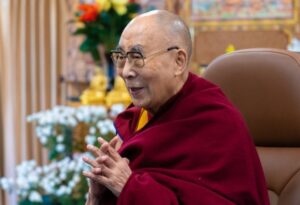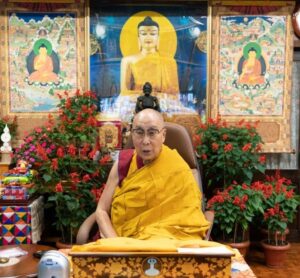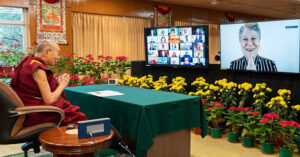
Photo: OHHDL
This month, His Holiness the Dalai Lama, the spiritual leader of Tibetans, gave two virtual teachings, Compassion and Love in the Context of Disaster Management and Educating the Heart for the New Millennium, both from his residence in Dharamshala.
On November 17, Major General Manoj Kumar Bindal of the National Institute of Disaster Management, India invited His Holiness to speak on compassion and love in the context of disaster management. First speaking about the relationship between Tibet and India, His Holiness said that despite Tibet’s close historical relation with its neighbouring country China, Tibetans choose to follow and model Tibetan alphabets on the Indian Devanagari script.
Referring to his studies and trainings since childhoodas a Buddhist monk, His Holiness said “because our training is based on logic and reason, we have been able to hold useful conversations with scientists. Among the topics we’ve discussed have been the workings of the mind and how to transform destructive emotions. I’m proud of being able to combine Buddhist philosophy with a scientific outlook. I like to think like my friend Francisco Varela, who was scientist, also deeply interested in Buddhism. He would say, ‘Now, I’m wearing my Buddhist hat’, or, ‘now I’m wearing my scientist’s hat’, according to the point of view he was advocating. The time has come to combine modern education with ancient Indian knowledge, on the basis of which we can make a significant contribution to knowledge on this planet.”
Speaking about compassion and love in the context of disaster Management, His Holiness said, “with regard to disaster management, whether our actions are positive or not depends on our motivation. The key factor is whether we have a compassionate attitude. India has longstanding traditions of ahimsa, doing no harm, and karuna, compassion. The crucial question is whether they can be combined with a modern outlook.”

Photo: OHHDL
His Holiness spoke of Mahatma Gandhi, saying that he showed that ahimsa, as non violence, could be applied in practical terms. “Doing no harm and non-violence are not only morally correct, they are practically appropriate too,” added His Holiness, going on to say that after spending the majority of his life in India, his brain is filled with ancient Indian knowledge. He said he is happy to be able to share what he understands of ancient Indian knowledge, and that it can contribute to creating a more peaceful world by helping people discover peace of mind. He emphasised that we have to transform the world on the basis of reason and education.
Commenting about how modern education pays less attention to how to develop peace of mind, His Holiness recommended taking steps to promote Karun and Ahimsa. “One aspect of Karun, or compassion, is to recognise that other people are just like us. As social animals, we have a natural tendency to help each other. Nevertheless, I really admire those people and organisations who step in to help people overwhelmed by disaster,” said His Holiness.
His Holiness concluded by saying,“I lost my country, my freedom and witnessed so much destruction and yet I still feel that my Middle Way Approach, seeking genuine autonomy that allows us to preserve our culture, is a realistic option. What’s more, increasing numbers of Chinese brothers and sisters are taking an interest in Buddhism and can learn from our traditions.”
The second teaching took place on November 24. His Holiness was welcomed by Professor Lia Diskin of Palas Athena in Brazil to speak on Educating the Heart for the New Millennium. Prof Diskin introduced His Holiness, speaking of the importance of his role in setting up Tibetan schools in exile for Tibetan children; of his discussions with scientists over the last 30 years and of his long standing concerns about climate change and damage to the environment.

Photo: OHHDL
His Holiness started the teaching by saying, “Our intelligence is a distinct human quality. Over the last few thousand years, the world has seen a great number of teachers and thinkers, including the Buddha, who displayed a wonderful human intelligence.” However, he said, if that intelligence is with combined with hatred, anger and fear, it can be very destructive and it must be combined with warm-heartedness instead. He continued, “By itself, intelligence will not have much impact on our physical health, but when it is combined with compassion and warm-heartedness, it brings peace of mind and improves our physical well-being”.
His Holiness further spoke on the importance of cultivating warm-heartedness, saying this is not just a religious matter – it helps in creating peace of mind and it is a necessity as we live in a community and need each other’s help. He went on to add that education today should include instruction on the role warm-heartedness plays in “individual’s good health, as well as in peace within families, communities and the world at large.”
Speaking about amount of money and energy spent on making weapons in the world His Holiness said, “we can start by acknowledging that the reason we manufacture so many weapons is because we are angry and afraid. If we can recognise the entire human family as one community, we won’t need these instruments of destruction.”
His Holiness also reiterated the importance of protecting our environment, saying “this world is our only home”.
His Holiness concluded by saying “My favourite subject is warm-heartedness. Compassion and warm-heartedness are not confined to religious practice. We are all human beings. Our mothers gave birth to us and we survived because of their care and affection. Warm-heartedness is not only the key factor for human survival, it is also the basis for being able to live as peaceful, happy human beings.”




 Print
Print Email
Email